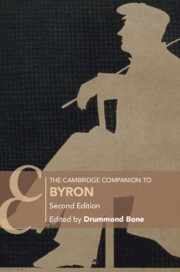Book contents
- The Cambridge Companion to Byron
- The Cambridge Companion to Byron
- Copyright page
- Contents
- Notes on Contributors
- Preface
- Chronology
- Abbreviations
- Chapter 1 Byron’s Life and His Biographers
- Chapter 2 ‘My Pen Is at the Bottom of a Page’
- Chapter 3 Byron’s Politics
- Chapter 4 Byron: Gender and Sexuality
- Chapter 5 Heroism and History
- Chapter 6 Byron and the Eastern Mediterranean
- Chapter 7 1816–1817: Childe HaroldIII and Manfred
- Chapter 8 Byron and the Theatre
- Chapter 9 Byron’s Experiments in Drama: 1820–1822
- Chapter 10 Childe Harold’s Pilgrimage iv, Don Juan, and Beppo
- Chapter 11 Redeeming Levity
- Chapter 12 The Vision of Judgment and the Visions of ‘Author’
- Chapter 13 Byron’s Bear and Other Animals
- Chapter 14 Byron’s Lyric Poetry
- Chapter 15 Byron and the Eighteenth Century
- Chapter 16 In Byron’s Wake
- Chapter 17 Byron, Postmodernism, and Intertextuality
- Chapter 18 ‘Writing Grows a Habit’
- Select Bibliography
- Index
- Cambridge Companions To Literature
Chapter 7 - 1816–1817: Childe Harold III and Manfred
Published online by Cambridge University Press: 02 November 2023
- The Cambridge Companion to Byron
- The Cambridge Companion to Byron
- Copyright page
- Contents
- Notes on Contributors
- Preface
- Chronology
- Abbreviations
- Chapter 1 Byron’s Life and His Biographers
- Chapter 2 ‘My Pen Is at the Bottom of a Page’
- Chapter 3 Byron’s Politics
- Chapter 4 Byron: Gender and Sexuality
- Chapter 5 Heroism and History
- Chapter 6 Byron and the Eastern Mediterranean
- Chapter 7 1816–1817: Childe HaroldIII and Manfred
- Chapter 8 Byron and the Theatre
- Chapter 9 Byron’s Experiments in Drama: 1820–1822
- Chapter 10 Childe Harold’s Pilgrimage iv, Don Juan, and Beppo
- Chapter 11 Redeeming Levity
- Chapter 12 The Vision of Judgment and the Visions of ‘Author’
- Chapter 13 Byron’s Bear and Other Animals
- Chapter 14 Byron’s Lyric Poetry
- Chapter 15 Byron and the Eighteenth Century
- Chapter 16 In Byron’s Wake
- Chapter 17 Byron, Postmodernism, and Intertextuality
- Chapter 18 ‘Writing Grows a Habit’
- Select Bibliography
- Index
- Cambridge Companions To Literature
Summary
This chapter discusses Canto III of Childe Harold and Manfred as marking a turning point in Byron’s writing career. Together, these two works detached Byron from the tragic universe of the Tales and pointed him towards the comic world of Don Juan. Childe Harold III turns from exploring the devastating trauma of painful memory – the Byronic Hero’s, the poet’s and post-Napoleonic Europe’s – to a quest for ways of forgetting pain through the imagination and communing with the natural world. Through these it finds a path into renewed, and new forms of, vitality, though these ultimately prove temporary and the return to the memory of pain inevitable. However, Manfred takes up Childe Harold III’s quest to discover the power of memory itself to console, comfort and revitalise. The result is a new, self-conscious, wilful, and appreciative acquiescence in the flow, and contrary flowings, of his own consciousness – indeed, his existence per se – even as he approaches his death. This prepares the way for Don Juan’s wholesale embrace of the spontaneous vitality, but also impermanence, of all human impulse(s) – an embrace that is fundamental to Byron’s comic vision.
Keywords
- Type
- Chapter
- Information
- The Cambridge Companion to ByronSecond Edition, pp. 111 - 125Publisher: Cambridge University PressPrint publication year: 2023

